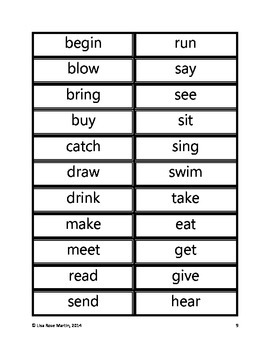

- Age of acquisiton of irregular past tense verbs how to#
- Age of acquisiton of irregular past tense verbs full#
Children produce irregular past tense errors well into the early. We then put them all together for extra practice and revision. First, the acquisition of specific past tense irregular verbs depends on children’s expo-sure to the verb (Marcus et al., 1992). We tackle them one at a time, with “mini-stories” for each verb. In this pack 4, we cover four of the highest frequency verbs in English with irregular past tense forms. Why is there a distinction between regular and irregular verbs in the first place Both the regular and. We’ve extracted the 57 most frequent irregular verbs in spoken English, and then sorted them into 10 broad groups. A rational account of regular and irregular past tense. Recast density and acquisiton of irregular past tense verbs. To help people to learn irregular past tense verbs methodically, we’ve reviewed the New General Service List-Spoken (Brown & Culligan, 2013): a list containing 721 words providing up to 90% coverage for unscripted spoken English. Thirteen children (78 years of age) with SLI and 13 language-similar children (56 years of age) with TL were exposed to 3 recast densities of novel irregular past tense verbs (none, conversation-like, intervention-like) over 5 sessions. Unfortunately, many of the highest frequency verbs in English have irregular past tense forms. Unlike regular past-tense verbs, irregular past-tense verbs do not use the -ed ending. For many people – including people learning English as a second language and people with language disorders – learning irregular past tense verbs is a huge challenge. Irregular Past-Tense: An action or state of being that happened in the past. Acquisition of irregular past tense by children with specific language impairment.
Age of acquisiton of irregular past tense verbs full#
We’re able to answer more questions in here because we have a full library of questions that we’ve already answered so our staff can either link you to the answer if it exists, or write you a custom response if needed.At around 30-36 months of age, typically developing children start to use irregular past tense verbs such as came, fell, broke, sat, and went in sentences. Some irregular verbs were correctly produced by age three, but others were still not mastered by age nine. regular past tense verbs and 8 probes eliciting irregular past tense verbs. (2) Overregularization occurs at a roughly constant low rate from the 2s into the school-age years, affecting most irregular verbs. We would be more than happy to answer your question inside the membership program. (1) Overregularization errors are relatively rare (median 2.5 of irregular past tense forms), suggesting that there is no qualitative defect in children's grammars that must be unlearned. If you are another speech-language professional, we have created a membership where we pay a full staff to answer questions like this on a regular basis. A simple and complete worksheet to practice regular and irregular past tense verbs.

If you are a parent, we suggest you reach out to a local speech-language pathologist who can work with your child directly and answer your question.

Since we have such a small staff, we aren’t able to answer every question that comes through on the website, social media, or via email. Children omitted regular past tense marking most often. The purpose of this study was to gain a preliminary view of children’s development of 49 irregular verbs. Results indicate that children's acquisition of the English past.
Age of acquisiton of irregular past tense verbs how to#
Unfortunately, we get a ton of questions every day about how to solve specific speech/language problems. In both groups, vocabulary size and word frequency predicted accuracy with regular and irregular verbs. However, other researchers and clinicians have suggested that irregular verbs continue developing much later into the school-age years. Collapsing across age group (since no interaction was observed), the likelihood of a verb being produced in regular past-tense form (e.g., gezzed chaked) was positively associated with the verb's similarity to existing regular verbs, consistent with the single-route model only.


 0 kommentar(er)
0 kommentar(er)
